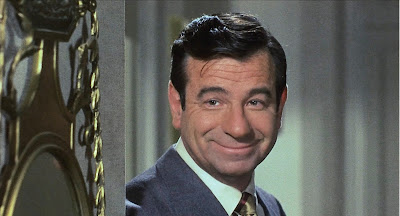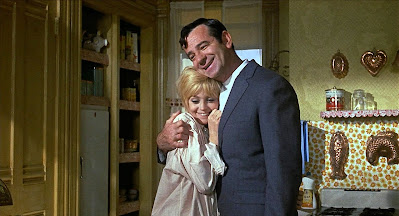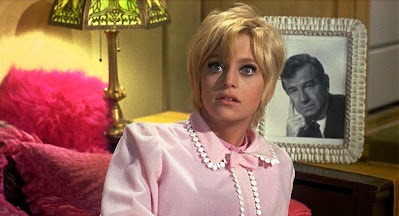 |
| Mrs. Dickinson admires her metaphor "Some flowers blossom late, but they're the kind that lasts the longest" |
During what could be called the movie industry's "Last Gasp" phase—a period wedged uneasily between the studio system excesses of the late-'60s and the emergence of the American New Wave of the early-'70s—Hollywood released a glut of wheezily old-fashioned films it attempted to pass off as "with it" and "now" entertainments that sought to capture the sudden cultural preoccupation with youth.
These woefully middle-class, middle-aged, and formulaically sitcom-y films strove to reflect a youthful perspective while effectively having absolutely no idea of what that actually was.
The result was the token insertion of self-consciously "hip" templates into the usual middle-of-the-road movie formulas. For example, rock music (which, to the septuagenarian ears running the studios, meant muzak-type stabs at the contemporary sound by veterans like John Williams and Henry Mancini); language and nudity unthinkable during the Hays Code years; aggressively contemporary (and instantly dating) mod costuming and art direction; and the inclusion of at least one cast member under the age of 40.
 |
| The Cactus Flower in Bloom |
In an effort to stay relevant or simply to stay fed, several stars of Hollywood's Golden Age willingly (if unwittingly) allowed themselves to be depicted as Generation Gap gargoyles in vehicles both ill-suited for and exploitative of their talents. In 1969, both Lana Turner and Jennifer Jones tarnished their images in the youth market mistakes The Big Cube and the has-to-be-seen-to-be-believed Angel, Angel, Down We Go, respectively. The following year, glamour girl Rita Hayworth appeared in a low-budget oddity titled The Naked Zoo, while screen legend Mae West made headlines in the more high-profile (but no less demoralizing) Myra Breckinridge.
Hollywood's leading men were far from immune to the same screen humiliations, but by and large, the double standard allowing for aging men to still appear as viable romantic leads opposite their much younger co-stars (Cactus Flower, anyone?) served as a considerable, sexist, buffer.
What distinguished these late-to-the-party stabs at contemporary relevance was their dogged prioritization of the older perspective. No matter how contemporary the themes were, the worldview presented was middle-aged, the youth angle was mere window-dressing.
When films took the generational divide seriously, movies like The Arrangement and The Happy Ending were the result. In these films, young people were used as plot devices initiating or solving the mid-life identity crises of the older lead character. When the approach was comedic, the dominant perspective was of the older generation reacting in smarmy, voyeuristic, and smirking ways about the New Permissiveness (a la Prudence and the Pill and The Impossible Years).
One of the better films to emerge from this cross-generational limbo is 1969s Cactus Flower. And while its perspective is no less mired in the middle-class and the middle-aged (playwright Abe Burrows was 55 when he adapted the 1964 French farce Fleur de Cactus [by Jean-Pierre Grady & Pierre Barillet] for the Broadway stage in 1965), Cactus Flower has a sprightly charm that begs forgiveness for its glaring contrivance.
Indeed, it can be said that Cactus Flower's theatrical roots (heh-heh) are on full display in the artificiality of its simple plot (one would be forgiven for assuming it the work of Neil Simon), and that it at times comes across like an extended Love, American Style episode (whose brightly-lit sitcom look it shares). But thanks to snappy pacing and an appealing cast, it avoids the fate that later befell its similar, gender-switch twin, the labored and tepid 40 Carats (1973). Bergman, Matthau, and Hawn stepping into roles originated onstage by Lauren Bacall (stage debut), Barry Nelson, and Brenda Vaccaro are a shining example of how charismatic and resourceful actors can turn run-of-the-mill dross into comedy gold.
 |
| Walter Matthau as Julian Winston |
 |
| Ingris Bergman as Stephanie Dickinson |
.JPG) |
| Goldie Hawn as Toni Simmons |
 |
| Jack Weston as Harvey Greenfield |
 |
| Rick Lenz as Igor Sullivan |
Confirmed middle-aged bachelor Julian Winston (Matthau) has managed to keep matrimonial designs out of the head of his much younger girlfriend, Toni (Hawn), by pretending to be the married father of three. When Toni's attempt at suicide (always a rousing way to get a romantic comedy off of the ground) prompts the Park Avenue dentist to propose, Winson asks his devoted nurse Mrs. Dickinson (Bergman) to pose as his wife in order to reassure Toni that she is not a homewrecker, and that the couple's impending divorce is both amicable and mutually desired.
Of course, this being a farce, nothing goes as planned, and all manner of Neil Simon-esque comic complications arise before the not-unexpected, age-appropriate, happy ending fade-out.
For all its attempts to appear current (discotheques, hippies, a "hip" soundtrack of pop tunes arranged by Quincy Jones), Cactus Flower can't disguise its origins in the "tired businessman" era of theater when breezily escapist musicals and plays were concocted for the benefit of NYC businessmen seeking to avoid the rush hour crunch of the trains to the suburbs. Dating back as far as 1952's The Seven Year Itch, these shows offered mindless laughs and tame titillation by way of middle-aged wish-fulfillment fantasies envisioning a world populated by bland professional men on the prowl pursued by bevies of beautiful young women who live only to be wed. That marriage is presented as the end-all and be-all symbol of happy-ending bliss has always struck me as positively perverse, given how prominently lying, deception, and serial adultery figure into the courtship rituals of the characters in these so-called sexually sophisticated comedies.
Everything is fair game for comedy, but as a kid, I always thought romantic comedies from the repressed, sex-equals-sexist '60s were a strange breed. Movies like Under the Yum Yum Tree, The Marriage-Go-Round, Boeing, Boeing, The Guide for the Married Man, and Any Wednesday all gave the sophomoric impression of being sex-obsessed, yet unable to find humor in the topic unless it was the smirking, giggling behind the hand, innuendo-laden type.
 |
| Eve Bruce as Georgia |
These comedies perpetuated an image of romantic courtship as an intricacy of calculated lies and tricks couples played on one another in an effort to avoid and/or hasten a walk down the aisle. If it was a domestic comedy, then the state of matrimony is depicted as a life sentence arrangement wherein the "domesticated" male can't wait to stray, and the clinging female is depicted as an emasculating killjoy.
 |
| Vito Scotti as Arturo Sanchez |
Cactus Flower is cut from much the same cloth, so I'm surprised as anyone that I like it so much (if you stop to think about the plot for too long, Julian comes off as a cruelly manipulative and selfish character undeserving of either of the ladies vying for him). Betraying its origins in French farce, Cactus Flower has so many characters having affairs out of wedlock, much of it comes off like a pro-adultery infomercial or something.
Nevertheless, the film wins me over. Maybe it has something to do with the humor (appealingly corny, old-fashioned, and leaning into vaudille-era one-liner delivery patterns) and the "harmless" characters who don't quite come off as human (nothing ever seems as offensive or offputting as it might because droopy Mattahau reminds me of Yogi Bear, and wide-eyed Hawn looks like Tweetie Bird). What I do know is that I find Cactus Flower to be amiable, sweet-natured, laugh-out-loud funny, and an absolute delight… almost in spite of itself.
WHAT I LOVE ABOUT THIS FILM
Say what you want about old Hollywood, but when it was at the top of its game, no one was better at turning out this type of frothy, intricate farce. Cactus Flower has the undistinguished yet delectable visual gloss of a Doris Day movie; a sardonically funny screenplay by Some Like it Hot's I. A. L. Diamond (adapted from Abe Burrows' play); snappy, keep-the-action-moving direction by Gene Saks; and, most advantageously, a cast of newcomers and veterans who skillfully know their way around a punchline.
 |
| Julian introduces Toni to his fake wife and her fake lover |
The premise of Cactus Flower is silly in the extreme, but it's unlikely anyone could devise a narrative journey I wouldn't want to be taken on by Goldie Hawn, Walter Matthau, Jack Weston, and Ingrid Bergman. I don't know if it's as obvious on a single viewing, but these four are champs. Weston nails every one of his comic lines, frequently making just his silent reactions hilarious. Hawn is vulnerable in the dramatic scenes (which she steals) and appealing in the comic. Bergman is great with a sardonic line and proves a wonderful foil for Matthau's slouchy charm.
And Matthau...I don't know that I would like this film as much without him. As I've stated, I think the Julian character is written rather creepily, but thanks to Matthau's likeability and endlessly flexible face (and that magic brow of his), the actor triumphs over the material.
Many directors swear by the art of casting, claiming that the right cast can salvage a weak screenplay. The screenplay for Cactus Flower isn't exactly weak (familiar, perhaps), but the cast is so first-rate that it elevates the material to heights it doesn't always rightfully earn.
My partner posed the provocative notion that back when Hawn was in her 50s, it would have been gimmicky fun to see her in a remake (rethink?) of Cactus Flower with her in the Mattahu role and some upcoming male comedic actor in his 20s take her role. With the switch of one letter, he could even retain her character's name: Tony.
 |
| Trade magazine ad congratulating Goldie Hawn for her Best Supporting Actress Oscar win |
PERFORMANCES
As Goldie Hawn's nomination and win for Cactus Flower is the only Oscar recognition the film received, it's a fact worth mentioning, but as an indication of merit... I'm not so sure.
Hawn is absolutely wonderful in the role, but in contemplating her win over Susannah York in They Shoot Horses, Don't They?, Dyan Cannon in Bob & Carol & Ted & Alice, and Catherine Burns in Last Summer, it helps to keep things in perspective. We're talking the Academy Awards here: an organization whose voters can't help factoring in sentiment, likability, inoffensiveness, publicity, and popularity before it gets around to evaluating performance mertit.
Hawn was the blonde "It" girl of the moment, and I think the public's affection for the bubble-head she portrayed on TV's outrageously popular Laugh-In factored heavily in her win. And apparently, the voting bloc of the Golden Globes felt the same, for Hawn also took that award home. I don't mean to sell Hawn short, for in this, her first major film role (in 1968, she appeared in Disney's creaky musical, The One and Only Genuine Original Family Band ), Hawn radiates genuine star quality and holds her own against veterans Matthau and Bergman in a way that must have been downright astounding to Laugh-In fans.
With her enormous eyes and Betty Boop voice, it is difficult not to watch Hawn every second. She's so excitingly kinetic a presence, she single-handedly blows the cobwebs off of Cactus Flower's sometimes stale bedroom humor. She does a marvelous job with a deceptively difficult role. She has to make Toni sweet and waiflike enough to care about, but strong and resilient enough so that Julian doesn't come off as a total selfish jerk.
Ingrid Bergman is not known for her comedy chops, but she and Matthau have excellent comic chemistry. I'd read that Dick Van Dyke was one of Cactus Flower's early casting considerations, and while I don't know if Lauren Bacall was ever asked to recreate her stage performance onscreen, Lee Grant was briefly in the running to be cast as the late-blooming leading lady. THE STUFF OF FANTASY
Goldie Hawn's character is a clerk in a Greenwich Village record store. The scenes set amongst the shelves of albums (featuring artists like Lou Rawls, The Beatles, Buck Owens, and Petula Clark), 8-track tapes, and walls of psychedelic blacklight posters feel as distant and of another time as any episode of Downton Abbey. They make me feel nostalgic...and old.
THE STUFF OF DREAMS
Because there's so little about Cactus Flower that reflects the year it was made, it plays better now than it did in 1969. In the year of Woodstock, the Stonewall Riots, Charles Manson, and the Vietnam War, America could certainly use a few laughs, but Cactus Flower's mid-life comedy must have seemed a tad out of touch.
Today, it's a film that fits snugly into the vague, pop-culture mashup that is the entire decade of the 1960s (on a double-bill, Cactus Flower would not look out-of-date opposite a Doris Day movie like 1963's Move Over, Darling), and feels charmingly corny and just a tiny bit camp (what with references to "love beads" and those lounging hippies outside of Stereo Heaven). But the dialogue makes me laugh, the performances are great fun to watch, and if I don't dwell too long on the whole lying-your-way-to-love subtext, I have a wonderful time watching it.
This is the rom-com done right.
Clip from "Cactus Flower" (1969)
THE AUTOGRAPH FILES
 |
| "Ken, see how old and mean you get if you hang around long enough." |
The autographed photo is from 1995, when I worked as Matthau's personal trainer (a situation that amused the legendary sloucher no end). I liked him a great deal and found him to be every bit as funny (he told the best dirty jokes!) and sweet as he appears on screen. With all the great anecdotes he shared about working in Hollywood, I'm the one who should have been paying for our sessions.








































